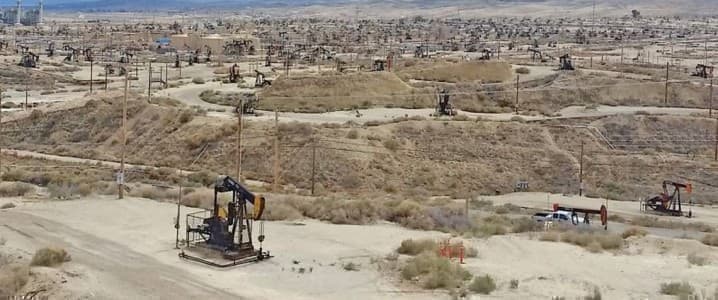“California needs to move beyond oil,” Governor Gavin Newsom said on Friday when he directed the Department of Conservation’s Geologic Energy Management (CalGEM) Division to initiate regulatory action to end the issuance of new fracking permits by January 2024.
That’s headline-catching news, but is it really a big deal for California’s oil industry?
The bigger news is that Governor Newsom has also asked the California Air Resources Board (CARB) to evaluate pathways to phase out all oil extraction across the state by no later than 2045.
“As we move to swiftly decarbonize our transportation sector and create a healthier future for our children, I’ve made it clear I don’t see a role for fracking in that future and, similarly, believe that California needs to move beyond oil,” Governor Newsom said.
The latest action comes less than two weeks after a bill that would have banned hydraulic fracturing in California along with most other ways of extracting crude oil failed to pass the state Senate’s Natural Resources and Water Committee by one vote.
The latest action from the Governor, who has said in the past that he himself lacks the authority to ban fracking via an executive order, is yet another sign of California’s goal to lead U.S. efforts in decarbonization and clean energy adoption.
The planned fracking ban itself is not expected to significantly impact oil production in the seventh-largest oil-producing state in the U.S., because hydraulic fracturing accounts for just 2 percent of total oil production in California. It’s more symbolic, really.
The possible ending of all oil production by 2045, however, would be a big deal and not just a symbolic move from the U.S. state looking to lead environmental justice in America. Related: Oil on Guard over Yemen as Saudi, Iran Meet in Secret
While environmental advocates cheered Governor Newsom’s action, oil industry associations and trade organizations expressed concern that the end of fracking and phase-out of all oil extraction would result in job losses and increased dependence on foreign oil imports, including from Saudi Arabia and Iraq.
Fracking Ban Faces Opposition
Just like the fracking bill that failed to pass the State Senate Committee earlier this month, rulemaking to end new fracking permits by 2024 is set to face opposition and likely face legal challenges.
“Once again, Governor Newsom has chosen to ignore science, data and facts to govern by bans, mandates and personal fiat. Banning nearly 20% of the energy production in our state will only hurt workers, families and communities in California and turns our energy independence over to foreign suppliers,” Catherine Reheis-Boyd, President & CEO of Western States Petroleum Association, said in a statement, commenting on the proposed fracking ban.
“Through all means possible, we will join with workers, community leaders and others who wish to protect access to safe, affordable and reliable energy to fight this harmful and unlawful mandate. We will be a key part of an equitable energy future for California,” Reheis-Boyd added.
“That means you also support increasing marine tankers that carry crude oil over sensitive waterways, into already congested ports in L.A., Long Beach, San Francisco — or you must support rail traffic through sensitive areas and communities,” Reheis-Boyd told Los Angeles Times.
It’s not only the oil industry associations that oppose moves to end oil drilling in California. Trade unions are also against it, fearing that job losses that may not be replaced with clean energy jobs. Related: EU Admits It Can’t Go Net-Zero Without Natural Gas
“This announcement, steeped in politics rather than facts and science, will bring about the loss of tens of thousands of good, middle-class, blue-collar jobs and double the cost of gasoline and diesel, adding more weight to the backs of already struggling California families,” Robbie Hunter, president of the State Building and Construction Trades Council of California, told the Los Angeles Times.
California’s average price of regular gasoline is the highest in the United States—at $3.994 per gallon as of April 26.
John Spaulding, executive secretary of the Building Trades Council for Kern, Inyo, and Mono counties, told the Los Angeles Times:
“I have one question for Gavin Newsom: Are our jobs too dirty for you?”
California Is Top U.S. Consumer Of Motor Gasoline And Jet Fuel
While California aims to lead decarbonization efforts and has moved to ban the sales of new passenger vehicles with internal combustion engines from 2035, it is still a major consumer of oil.
California is America’s top solar power producer, but it is also the nation’s largest consumer of both jet fuel and motor gasoline. The state accounted for 17 percent of U.S. jet fuel consumption and 11 percent of motor gasoline consumption in 2019, the last “normal” year of fuel demand, EIA data shows.
California was also the third-largest U.S. state by refining capacity as of early 2020, while foreign oil suppliers, led by Saudi Arabia, Iraq, Ecuador, and Colombia, provided more than half of the crude oil refined in California in 2019.
In total, California is the second-largest consumer of all petroleum products combined, accounting for 10 percent of the U.S. total, as per EIA data.
Oil production in the state, however, has dropped by nearly two-thirds since its peak in 1985. Back then, California was producing 1.1 million barrels per day (bpd), while in 2020, the average oil production was 394,000 bpd.
California’s oil production is on a permanent decline, the EIA figures show. But legislation to ban fracking and then phase out oil extraction would hit not only California-focused drillers. It would also result in job losses and would further raise the state’s dependence on oil-producing countries that do not plan to heed calls from environmental justice warriors anytime soon.
By Tsvetana Paraskova for Oilprice.com
More Top Reads From Oilprice.com:
- Oil And Gas Bankruptcies Jump Despite Rise In Crude Prices
- Saudi Arabia's Shift To Renewables Could Save It $200 Billion
- Bullish Oil News Offset By New Lockdowns In India


















